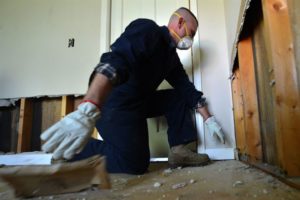
“Hurricanes, floods and extended disaster evacuations can result in extensive mold growth in many homes at the same time – creating a cleanup crisis. Everyone with a water-damaged home faces similar challenges, since mold must be remediated before repairs can begin. This process can be hazardous because of potential health effects of exposure to mold, bacteria, other contaminants and damaged structures. Although there is no such thing as ‘toxic mold,’ some molds are toxigenic, that is, they can produce and contain toxins. People react differently to the presence of mold—some may have no adverse health reaction to airborne mold spores, while others may experience severe illness from low-level exposure (Reichel, C, 2012).”
In 2003 Texas adopted one of the most stringent sets of regulations in the nation for individuals engaged in mold remediation. Individuals who inspect, analyze and recommend remediation actions are known as mold assessors. People who engage in the business of correcting mold problems are known as mold remediators. To do either, Texas law requires a license from the Texas Department of State Health Services (TDSHS). Before hiring a contractor, ask to see business licenses (including those of the employees doing the work).
Before entering into a mold remediation contract, make sure the contract spells out exactly what is to be corrected. The following points should be included:
- Diagram or survey that details square feet, rooms, or sections of the area in which remediation will be done.
- Specific amount of time it will take to complete the remediation work.
- Itemized list of materials (e.g., lumber, wallboard/sheetrock, carpet and padding, paint) required to complete the remediation.
- Who (homeowner or contractor) will provide the renovation materials.
- How the contaminated materials will be handled and whether the homeowner or contractor will remove debris from the site.
- Detailed warranties of work and guarantees on remediation.
- Cleanup procedures and products to be used as well as a cost breakdown and total price cap.
It is a good practice to obtain at least three estimates (bids) before signing a contract. Ask for information about the contractors education or training. Ask for references from clients for whom the contractor has performed mold remediation work. Reputable contractors will be happy to provide names and contact information from satisfied customers. Also, check with the Better Business Bureau for filed complaints.
Make sure you understand all of the terms of the contract before signing. In Texas, any contract for work to be done on your homestead MUST contain the following statement next to the signature space:
“Important Notice: You and your contractor are responsible for meeting the terms and conditions of this contract. If you sign this contract and you fail to meet the terms and conditions of this contract, you may lose your legal ownership rights in your home. KNOW YOUR RIGHTS AND DUTIES UNDER THE LAW.”
Because the contractor can legally place a lien on your home if you do not make payments, you could lose your home. Make sure you can meet all of the obligations under the contract before you sign. You should consult an attorney if you have any questions.
Stick with the plans. Making changes after work begins could lead to cost overruns and delays.
Pay by check or credit card – NEVER CASH. Write out the check to the contracting company, not an individual. Paying by credit card provides certain consumer protections and assistance by the credit card company in resolving disputes. A reasonable down payment of 30 percent of the total project can be paid upon initial delivery of materials. Make sure you receive a detailed receipt crediting all payments you have made.
Make final payments only when the work is completed to your satisfaction. A reputable contractor will not threaten you or pressure you to sign documents if the job is not finished.
Sources:
Reichel, C, (2012). Hiring a mold remediation contractor. Louisiana State University Extension, http://www.lsuagcenter.com/portals/communications/publications/publications_catalog/disaster%20information/recover/hiringamoldremediationcontractor. Retrieved August 31, 2017.
Renchie, DL (2006). Texas A&M ArgiLife Extension Service, https://texashelp.tamu.edu/wp-content/uploads/2016/02/ER027-selecting-mold-remediation-contractors.pdf . Retrieved August 31, 2017.
Texas A&M ArgiLife Extension Service, Hiring a reputable contractor, https://texashelp.tamu.edu/wp-content/uploads/2016/02/hiring-a-reputable-contractor.pdf. Retrieved August 31, 2017.
